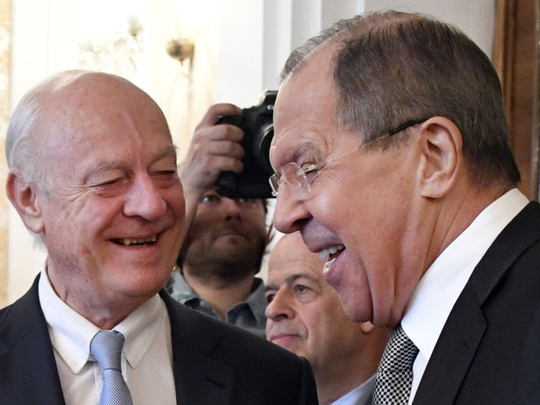
Beirut: A US-led coalition strike is reported to have killed 33 civilians in northern Syria ahead of a Wednesday meeting of top officials in Washington focused on defeating Daesh.
Rebels pressed offensives inside the capital Damascus and the central province of Hama, just a day before new UN-brokered peace talks open in Geneva.
Years of diplomatic efforts have failed to end Syria’s raging six-year conflict, which began with protests against President Bashar Al Assad.
The war has killed more than 320,000 people, sparked a major refugee crisis, and dragged in world powers, including the US-led air coalition bombing Syria’s, rebels since 2014.
A reported coalition strike in the northern province of Raqqa early on Tuesday has killed 33 civilians, according to the Syrian Observatory for Human Rights.
The monitor said on Wednesday that the strike hit a school being used as a temporary shelter for displaced families, about 30 kilometres west of Daesh-held Raqqa city.
“We can now confirm that 33 people were killed, and they were displaced civilians from Raqqa, Aleppo and Homs,” said Observatory head Rami Abdul Rahman.
“They’re still pulling bodies out of the rubble until now. Only two people were pulled out alive,” Abdul Rahman said.
“Raqqa is Being Slaughtered Silently,” an activist group that publishes news from Daesh-held territory in Syria, blamed the coalition for the strike.
“The school that was targeted hosts nearly 50 displaced families,” it said.
The US-led coalition is backing twin offensives to defeat Daesh in Raqqa — the Syrian heart of the group’s so-called “Islamic caliphate” — and Mosul in neighbouring Iraq.
Top officials from the 68-nation alliance are set to meet in Washington to hear more about a revised plan drafted by the Pentagon and presented to US President Donald Trump in February.
Earlier this month, the coalition said its campaign in Syria and Iraq had unintentionally killed at least 220 civilians, but monitors say the real number is far higher.
In addition to bombing raids by the coalition, Russia is carrying out strikes in support of its ally Al Assad and Turkey has provided air cover for rebel groups in the north.
Control of war-ravaged Syria is divided between myriad armed groups — rebels, Kurdish militia and Syrian government forces.
This week, rebels launched two surprise offensives on government positions in Damascus and central Hama province, opposition groups and the Observatory said.
In Damascus, anti-regime factions are battling to link up territory they hold in the eastern district of Jobar with their encircled forces in the Qabun neighbourhood to the north.
Clashes continued on Wednesday as at least nine air strikes pounded rebel positions, the Observatory said.
Damascus has witnessed heavy fighting since Sunday, when the opposition fighters made their largest incursion yet into the capital’s east.
On Wednesday, AFP correspondents in the city could hear warplanes buzzing overhead and intermittent mortar fire throughout the morning, as several soldiers were seen loading ammunition into machine guns.
The Damascus offensive is being led by the Tahrir Al Sham alliance, dominated by the Fateh Al Sham Front that was once linked to Al Qaida.
Tahrir Al Sham and allied rebels launched a fresh assault on Tuesday in the central province of Hama, overrunning the key town of Suran and several other government positions.
“They have seized several new villages today as well as old army depots,” Abdul Rahman said.
“They are continuing to advance despite heavy Russian and Syrian air strikes” on Wednesday.
Footage published by Tahrir Al Sham depicted fighters firing rockets from a field onto regime positions.
The escalating violence comes just a day before a new round of UN-brokered peace talks in Geneva hosted by UN special envoy Staffan de Mistura.
In Moscow on Wednesday for final meetings before the talks, de Mistura said the developments “raise concerns. We must seek to achieve a political process as quickly as possible,” he said.
De Mistura will travel to rebel backer Ankara on Thursday and will then return to Switzerland to lead the talks.












